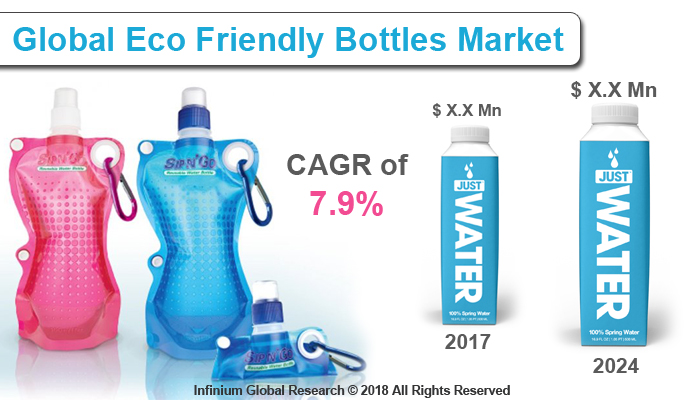Eco Friendly Bottles Market (Material - Starch, Polylactic Acid, Water Soluble Polymers, Cellulose, Moulded Fiber, Aliphatic/Aromatic Co-polyesters, Bio-derived Polyethylene and Polyhydroxyalkanoates; Application - Mineral Water, Household Products and Non-Alcoholic Beverages): Global Industry Analysis, Trends, Size, Share and Forecasts to 2024
A recent report published by Infinium Global Research on eco friendly bottles market provides in-depth analysis of segments and sub-segments in global as well as regional eco friendly bottles market. The study also highlights the impact of drivers, restraints and macro indicators on the global and regional eco friendly bottles market over the short term as well as long term. The report is a comprehensive presentation of trends, forecast and dollar values of global eco friendly bottles market. According to the report the global eco friendly bottles market is projected to grow at a CAGR 7.9% over the forecast period of 2018-2024.

Segment Covered
The report on global eco friendly bottles market covers segments such as material and application. On the basis of material the global eco friendly bottles market is categorized into starch, polylactic acid, water soluble polymers, cellulose, moulded fiber, aliphatic/aromatic co-polyesters, bio-derived polyethylene, and polyhydroxyalkanoates. On the basis of application the global eco-friendly bottles market is categorized into mineral water, household products, and non-alcoholic beverages.
Geographic Coverage
The countries covered in the North America region include the U.S., Canada, and Mexico; while Asia-Pacific includes China, Japan, India, South Korea, Malaysia, and among others. Moreover, Germany, U.K., France, Spain, and Rest of Europe are included in the European region. The U.S. drives the growth in the North America region as it is the largest market in the region. The Asia-pacific region offers substantial potential for the market growth owing to rapid growth in markets such as India and China. The APAC region is projected to experience growth at a CAGR of x.x% over the period of 2018-2024.
Companies Profiled:
The report provides profiles of the companies in the global eco friendly bottles market such as Earthlust, EcoXpac A/S, Cascade Designs Inc., One Green Bottle, Ecologic Brands Inc., SKS Bottle and Packaging Inc., Pepsi-Cola Metropolitan Bottling Company and Pachamama.
Report Highlights:
The report provides deep insights into demand forecasts, market trends, and micro and macro indicators. In addition, this report provides insights into the factors that are driving and restraining the global eco friendly bottles market. Moreover, IGR-Growth Matrix analysis given in the report brings an insight into the investment areas that existing or new market players can consider. The report provides insights into the market using analytical tools such as Porter's five forces analysis and DRO analysis of eco friendly bottles market. Moreover, the study highlights current market trends and provides forecast from 2018-2024. We also have highlighted future trends in the eco friendly bottles market that will impact the demand during the forecast period. Moreover, the competitive analysis given in each regional market brings an insight into the market share of the leading players. This report will help manufacturers, suppliers, and distributors of the eco friendly bottles market to understand the present and future trends in this market and formulate their strategies accordingly.
